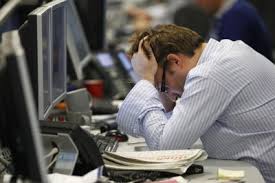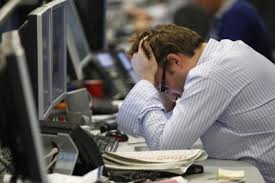
After New Zealand set the bar high with a surprise rate cut that sent its currency tumbling, expectations for a fresh shot of stimulus from the European Central Bank on Thursday pushed down the euro and government bond yields.
With London's FTSE, the DAX in Frankfurt and the CAC40 in Paris adding between 0.1 and 0.3 percent to the 13 percent they have gained over the last month, Europe's main stock markets got off to a solid start.
As traders did some final buying ahead of the ECB's interest rate decision and the news conference by governor Mario Draghi, the euro was down at $1.0970, while euro zone bond yields from Germany to Greece were slightly lower.
The bank's policymakers have tried to avoid stirring up speculation ahead of this meeting following disappointed markets with an unspectacular package of measures in December.
The latest Reuters poll shows the bank adding another 10 billion euros a month to its 1.5 trillion euro bond-buying program as the economists’ bets are on at least another 10 basis points being sliced off its already negative -0.3 percent deposit rate.
Being more targeted with its government bond buys, scrapping the lower price limit it is prepared to buy at and purchasing more risky types of asset backed securities to tiering its negative rates are some of the range of options that the ECB has.
"The market is a bit wishy washy, not a whole lot is priced in because of the doubts over whether they (ECB) can really deliver," said Saxo bank head of FX strategy John Hardy.
"So if you get some real innovation from the ECB you will see a big reaction from the euro. Especially if they can change the capital key (country-by-country purchase percentages) or there are new measures geared at helping banks' balance sheets," Hardy said.
With benchmark Brent futures LCOc1 holding at just over $40 a barrel, oil prices, were steady in early European trading. Prices of oil is one of the main drivers behind the rapid fall in inflation which has been such a headache for central banks like the ECB.
The ECB will also release new economic forecasts later. It is likely that the ECB will show inflation this year at zero, or maybe even negative as the bank will not have captured the recent rebound in oil and this would be the first time ever they have done so for a year.
Pre-empting the ECB and cutting its main interest rate to a record low 2.25 percent, the big surprise in Asia overnight came from New Zealand's central bank.
Reflecting global concerns over a slowdown in the world's second-biggest economy and citing China as a major risk to the bank's outlook for economic growth and inflation, the Kiwi dollar tumbled to $0.6618.
"If China had a very significant and prolonged devaluation, it would in essence spread deflation around the world," Reserve Bank of New Zealand Governor Graeme Wheeler said, adding that China was building up a number of serious imbalances.
Expectations that an aggressive showing from the ECB later could see dovish reactions from the Bank of Japan, Fed, Swiss National Bank and Bank of England which all meet over the next week and a bit, Asian stocks edged up encouraged by the previous day's rally in crude prices.
(Source:www.reuters,com)
With London's FTSE, the DAX in Frankfurt and the CAC40 in Paris adding between 0.1 and 0.3 percent to the 13 percent they have gained over the last month, Europe's main stock markets got off to a solid start.
As traders did some final buying ahead of the ECB's interest rate decision and the news conference by governor Mario Draghi, the euro was down at $1.0970, while euro zone bond yields from Germany to Greece were slightly lower.
The bank's policymakers have tried to avoid stirring up speculation ahead of this meeting following disappointed markets with an unspectacular package of measures in December.
The latest Reuters poll shows the bank adding another 10 billion euros a month to its 1.5 trillion euro bond-buying program as the economists’ bets are on at least another 10 basis points being sliced off its already negative -0.3 percent deposit rate.
Being more targeted with its government bond buys, scrapping the lower price limit it is prepared to buy at and purchasing more risky types of asset backed securities to tiering its negative rates are some of the range of options that the ECB has.
"The market is a bit wishy washy, not a whole lot is priced in because of the doubts over whether they (ECB) can really deliver," said Saxo bank head of FX strategy John Hardy.
"So if you get some real innovation from the ECB you will see a big reaction from the euro. Especially if they can change the capital key (country-by-country purchase percentages) or there are new measures geared at helping banks' balance sheets," Hardy said.
With benchmark Brent futures LCOc1 holding at just over $40 a barrel, oil prices, were steady in early European trading. Prices of oil is one of the main drivers behind the rapid fall in inflation which has been such a headache for central banks like the ECB.
The ECB will also release new economic forecasts later. It is likely that the ECB will show inflation this year at zero, or maybe even negative as the bank will not have captured the recent rebound in oil and this would be the first time ever they have done so for a year.
Pre-empting the ECB and cutting its main interest rate to a record low 2.25 percent, the big surprise in Asia overnight came from New Zealand's central bank.
Reflecting global concerns over a slowdown in the world's second-biggest economy and citing China as a major risk to the bank's outlook for economic growth and inflation, the Kiwi dollar tumbled to $0.6618.
"If China had a very significant and prolonged devaluation, it would in essence spread deflation around the world," Reserve Bank of New Zealand Governor Graeme Wheeler said, adding that China was building up a number of serious imbalances.
Expectations that an aggressive showing from the ECB later could see dovish reactions from the Bank of Japan, Fed, Swiss National Bank and Bank of England which all meet over the next week and a bit, Asian stocks edged up encouraged by the previous day's rally in crude prices.
(Source:www.reuters,com)





